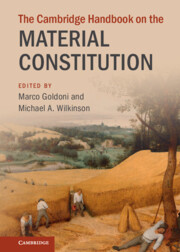Book contents
- The Cambridge Handbook on the Material Constitution
- The Cambridge Handbook on the Material Constitution
- Copyright page
- Contents
- Contributors
- Introduction
- Part I History
- Part II Challenges
- Part III Analyses
- 18 A Material Understanding of Constitutional Changes
- 19 The Material Constitution in Latin American Courts
- 20 A Materialist Analysis of the Indian Constitution
- 21 China’s Material Constitution
- 22 The Material Constitution and Extractive Political Economy
- 23 The Military in the Material Constitution of Turkey
- 24 The Material Constitution of International Investment Law
- 25 The ‘Terrible’ Functional Constitution of the European Union
- Index
20 - A Materialist Analysis of the Indian Constitution
from Part III - Analyses
Published online by Cambridge University Press: 15 January 2023
- The Cambridge Handbook on the Material Constitution
- The Cambridge Handbook on the Material Constitution
- Copyright page
- Contents
- Contributors
- Introduction
- Part I History
- Part II Challenges
- Part III Analyses
- 18 A Material Understanding of Constitutional Changes
- 19 The Material Constitution in Latin American Courts
- 20 A Materialist Analysis of the Indian Constitution
- 21 China’s Material Constitution
- 22 The Material Constitution and Extractive Political Economy
- 23 The Military in the Material Constitution of Turkey
- 24 The Material Constitution of International Investment Law
- 25 The ‘Terrible’ Functional Constitution of the European Union
- Index
Summary
Constitutionalism in the decolonising world was not merely an adoption of a set of norms pre-fabricated in the West. A materialist analysis of the Indian constitution argues for the socio-historical specificity of the post-colonial constituent project. Externally the goal of decolonisation was not just political freedom but also economic sovereignty. Internally an under-developed and unequal society posed a persistent danger of unrest for the new regime. Across much of the post-colonial world the solution was a project of planned state-led development and social transformation. The post-colonial constitution was designed to facilitate and realise this goal. These projects demanded the primacy of sovereignty over property and, hence, the constitution differentiated from metropolitan norms privileging property and constraining state interventions. It was a constitution by and for administrators and planners who were the vanguards of Third Worldism. Sans a popular mobilisation, however, a top down project of transformation through constitution failed. As the fortunes of planning declined and the Third World was ‘liberalised’, lawyers supplanted the administrators as the primary custodians of the post-colonial constitutions. Projects of planned transformation gave way to social rights litigation.
- Type
- Chapter
- Information
- The Cambridge Handbook on the Material Constitution , pp. 288 - 300Publisher: Cambridge University PressPrint publication year: 2023



